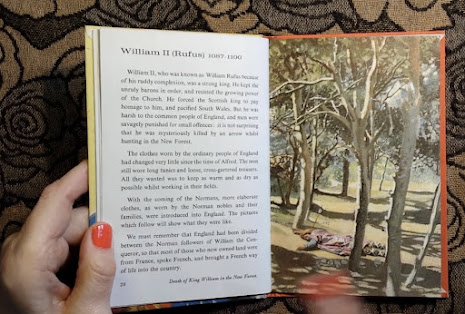For English schoolsprogs of my generation this two volume Ladybird edition, 'Kings and Queens of England', was the go-to reference tool, pretty much up to A-level. First impressions of all our monarchs were fixed for life here.
The illustration above features a piece of misinformation, for William Rufus took the wayward arrow in the chest. His initial reaction was to reach down and snap the shaft. But he then sank to his knees and toppled forward, landing on his chest and pushing the arrow-head deeper, which killed him immediately.
In that instant all kingly authority and mystery vanished — and as with his father, Rufus’s lifeless corpse was treated as awkward junk to be despoiled and quickly disposed of, his brother Henry riding off ahead of the news to seize the Royal treasury at Winchester.
Ladybird took the line that the Conqueror's second son was most interesting for his 'unsurprising' end and for some sartorial updates around his kingdom.
By the time I reached university Rufus had become one of my favourite early medieval monarchs, largely because of his non-normative approach to the role, and because he had overseen the construction of both Westminster Hall (where he sat on a marble throne) and the wall around the Tower, but I do have to recognise that were I say Welsh or a devout Christian, I might have formed a rather different opinion.
His interference in Scottish affairs is also suggested in this text. In spite of what Shakespeare later had to say, Macbeth was a decent enough ruler up there. He even paid the Pope a visit in Rome. The Normans however, sponsored Malcolm "Canmore", Duncan's son who, having defeated and decapitated Macbeth, swore fealty to Rufus in 1091 in return for a range of benefits which the King of England of course reneged on. When Malcolm III and his son came south across the border to have a good old Scottish moan they were ambushed and killed in Northhumbria.
It was Rufus's treatment of his Archbishop of Canterbury that I used to find rather drôle. Just prior to a significant naval expedition, Anselm offered to bless the King's fleet and Rufus is said to have scoffed: “As to his blessings and prayers, I utterly abominate them and spew them from me!’
Now that's how to deal with "thoughts and prayers"!
The Archbishop was soon a refugee crossing the channel in a small boat, but in the opposite direction to the one we are currently familiar with. Before being allowed to set off, Rufus's men made him wait on the beach at Dover while his bags were searched for illegal correspondence.
The man who copped the blame for the apparent hunting accident which ended this colourful reign, a knight named Walter Tirel, insisted until his dying day that he was not responsible and had been hunting in another part of the New Forest that day.
Legend has it though that on the morning of the hunt a blacksmith approached the King, at that moment frazzled by a nightmare-hangover combo, and offered him six arrows. Rufus is said to have kept four and handed the remaining pair over to Tirel with the words, "It is only right that the sharpest arrows should be given to the man who knows how to shoot the deadliest shots.”


No comments:
Post a Comment